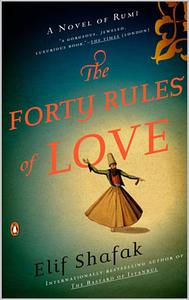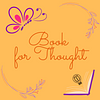Take a photo of a barcode or cover
2.25k reviews for:
قواعد العشق الأربعون: The Forty Rules of Love
جلال الدين الرومي, Elif Shafak, خالد الجبيلي
2.25k reviews for:
قواعد العشق الأربعون: The Forty Rules of Love
جلال الدين الرومي, Elif Shafak, خالد الجبيلي
emotional
informative
inspiring
sad
Plot or Character Driven:
Character
Strong character development:
Yes
Ok so good book, let’s say i was at a 3/5 by the end. It was a beautiful exploration of surrendering to love, combined with scriptural elements that were so fluidly incorporated (?) but i felt some things, i guess maybe a little both in relation to plot and characters, felt less smooth and a little clunky. I think sometimes when its from the perspectives of loads of characters this can happen.
But then I read Shafak’s note at the end about her translation process has just had me a bit bowled over. She writes in English, then has it translated into Turkish, and then re-translates it back into English. Like what the hell!!! the layers of meaning, of words that can’t be translated, the idioms and contexts which are chopped up and then remoulded. I’m now really eager to read another of Shafak’s books with this knowledge :)
But then I read Shafak’s note at the end about her translation process has just had me a bit bowled over. She writes in English, then has it translated into Turkish, and then re-translates it back into English. Like what the hell!!! the layers of meaning, of words that can’t be translated, the idioms and contexts which are chopped up and then remoulded. I’m now really eager to read another of Shafak’s books with this knowledge :)
Preachy, propaganda style Quran porn.
Just couldn’t get into this, will give it a go again on holiday.
This is one of my favourite books! I read it first when I was a teenager and absolutely loved it - facts and lessons about life that I knew should be like it's written, but you never really think about it or put it into words. Finally reread it at 27 and somehow it's even closer to my heart. No judgement in it - only love, spirituality and universal truths.
"Rule 40: A life without love is of no account. Don’t ask yourself what kind of love you should seek, spiritual or material, divine or mundane, Eastern or Western. Divisions only lead to more divisions. Love has no labels, no definitions. It is what it is, pure and simple. Love is the water of life. And a lover is a soul of fire! The universe turns differently when fire loves water."
"Rule 40: A life without love is of no account. Don’t ask yourself what kind of love you should seek, spiritual or material, divine or mundane, Eastern or Western. Divisions only lead to more divisions. Love has no labels, no definitions. It is what it is, pure and simple. Love is the water of life. And a lover is a soul of fire! The universe turns differently when fire loves water."
reflective
slow-paced
Plot or Character Driven:
Character
Strong character development:
Complicated
Loveable characters:
Complicated
Diverse cast of characters:
Yes
Flaws of characters a main focus:
Yes
Despite having seen Elif Shafak’s books around many, many times, I had never read any of her work. So, when the opportunity to join this blog tour came, I jumped at the chance to finally read one of the author’s most famous books. Shafak’s books have been praised far and wide, and this book boasts an impressive average rating on Goodreads, so my expectations were very high. Perhaps this was my mistake, and my expectations were too high, but I feel as though I didn’t find something to match them in this book. Now, I didn’t dislike the book, but I also wasn’t blown away. To be perfectly honest, it was just fine for me, which is what made this review so hard to write.
The premise is actually very intriguing. Ella, a lonely, depressed housewife in the USA, starts reading an unpublished manuscript about 13th-century Sufi poet Rumi and his companion/mentor Shams of Tabriz. By exploring the lives and teachings of the two mystics, Ella is compelled to change her life and is determined to meet the manuscript’s mysterious author. This is a classic book-within-a-book set-up, as we readers follow both present-day Ella and Sweet Blasphemy, the fictional manuscript which is itself narrated through multiple POVs. So far, so good.
I don’t know enough about Sufism to weigh in on how historically accurate this is, but I enjoyed reading and learning more about it. Those parts of the book that focused more on Shams and Rumi’s relationship and their philosophical and spiritual quest were by far my favourites. The author’s writing style also worked very well for those sections, enhancing their mystical qualities in a way that reminded me of the feeling of reading Paulo Coelho’s books. The short chapters further made the story flow easily, so that despite the topics tackled it was a smooth read.
I had a few issues with this though, which mainly boil down to the characters and their (lack of) development. As I already mentioned, there are several POVs here – arguably a few too many – which should serve to provide different perspectives from which to observe Shams and Rumi, and reflect on their teachings. Regrettably, though, none of these characters felt developed at all beyond being a generic placeholder for highly stereotypical and one-dimensional figures.
So, we are presented with the exploited prostitute seeking spiritual redemption, the shunned leper beggar, the wise benevolent drunk, the violent enforcer, or the close-minded religious extremist, and so on. Their main purpose seems to be acting as conduits through which Shams’s titular forty rules can be presented to the reader. Although I did like the forty rules themselves and the idea to have other characters show us Shams through their eyes, this often felt clumsy. And by this I mean characters literally saying things like: “Rule number so-and-so says this: [proceeds to enunciate the rule]”.
I was also surprised by how little space any of the female characters is given within this narrative. They are essentially left to play the mother, the wife or the prostitute, with no role or agency beyond what Shams – directly or indirectly – gives them. Although, to a certain extent, that could be said of most characters. There was also a certain degree of orientalism that seemed to permeate the novel – manifesting itself especially but not exclusively in Ella’s POV – which I was not expecting in a novel written by a Turkish author, but which was nonetheless somewhat disturbing.
Despite the issues I had with it, the historical part of the novel was still interesting. Whereas I can’t really say the same of the present-day storyline. Ella’s character is as flat as they come – a housewife and mother-of-three who is thoroughly disappointed with her life finding new resolve once she stumbles upon the exotic mysticism embodied by the mysterious author of the book she’s reading. I’m heading near spoiler territory here, so I won’t say more, but I found this to be the weakest part of the book and, quite frankly, I wouldn’t have felt its absence had it been removed from the book.
If you read this far, thank you! I had actually not meant to write such a long review, but overall, I feel very conflicted about this book and needed to get my thoughts out fully. Like I said at the start, I didn’t dislike the book despite all the issues I had with it, and picking it up at night never felt like a chore. There were also some really beautiful passages, especially in the more reflective and spiritual/philosophical parts, that I found to be very touching.
However, I was expecting more from this book than a collection of meaningful quotes and I found that to be quite lacking. I seem to definitely be in the minority on this, though, as many other readers seem to have adored this book! I would like to try reading more of Shafak’s books too, as I’m curious to see if I’ll end up liking any of her other works better. Let me know in the comments if there are any you’d recommend I try next!
I received an e-arc of this book for free as part of the blog tour organised by Random Things Tours. This did not affect my opinion of the book in any way.
I received an e-arc of this book for free as part of the blog tour organised by Random Things Tours. This did not affect my opinion of the book in any way.
Graphic: Religious bigotry, Murder
Moderate: Alcoholism, Infertility
Definitely one of the best book I've read this year.
Every rules are worth bookmarked, it did changed my perspective, it literally changed my life! I was going through emotional phase when I pick this book and I am glad that I made that decision.
Every rules are worth bookmarked, it did changed my perspective, it literally changed my life! I was going through emotional phase when I pick this book and I am glad that I made that decision.
reflective
medium-paced
Plot or Character Driven:
A mix
Strong character development:
Complicated
Loveable characters:
Complicated
Diverse cast of characters:
Yes
Flaws of characters a main focus:
Yes








